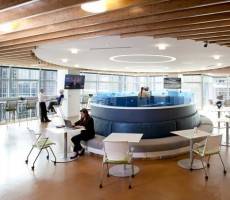October 8, 2014
Two thirds of the world’s workers would move to another country to find a better job
 Almost two thirds of job seekers worldwide say they would be willing to move abroad for work, a ‘startlingly high proportion’ that says a lot about the evolving marketplace for talent, according to a new study by The Boston Consulting Group (BCG) and The Network, a global alliance of more than 50 recruitment websites. The report claims that the proportion of people willing to seek a better job abroad is particularly (and unsurprisingly) high in developing and politically unstable countries. But there is also a very high willingness to work abroad for workers in countries that don’t face such challenges. For example, more than 75 percent of survey respondents in Switzerland, more than 80 percent of respondents in Australia, and more than 90 percent of respondents in the Netherlands say they would consider moving to another country for work, according to the report, Decoding Global Talent: 200,000 Survey Responses on Global Mobility and Employment Preferences, and their preferred destinations are London, New York and Paris.
Almost two thirds of job seekers worldwide say they would be willing to move abroad for work, a ‘startlingly high proportion’ that says a lot about the evolving marketplace for talent, according to a new study by The Boston Consulting Group (BCG) and The Network, a global alliance of more than 50 recruitment websites. The report claims that the proportion of people willing to seek a better job abroad is particularly (and unsurprisingly) high in developing and politically unstable countries. But there is also a very high willingness to work abroad for workers in countries that don’t face such challenges. For example, more than 75 percent of survey respondents in Switzerland, more than 80 percent of respondents in Australia, and more than 90 percent of respondents in the Netherlands say they would consider moving to another country for work, according to the report, Decoding Global Talent: 200,000 Survey Responses on Global Mobility and Employment Preferences, and their preferred destinations are London, New York and Paris.













 Avanta Serviced Office Group has signed a deal to establish a new business centre in the heart of London’s Tech City at The Eagle, a 27 storey art-deco-style development on City Road, EC1, from Mount Anvil – Central London’s specialist residential-led developer. The centre is set to open on the 1st March 2015. The new centre will provide over 26,000 square feet of flexible office space over two floors, with approximately 400 desks. Set within a mixed-use development comprising retail, affordable accommodation, offices and high-end residential, it is located within TFL’s Zone 1, approximately five minutes’ walk from Old Street Rail and Underground Station, just two stops from Kings Cross.bThis is Avanta’s first site within Tech City, also known as Silicon Roundabout, which is the third largest technology start-up cluster in the world and home to over 15,000 growing businesses.
Avanta Serviced Office Group has signed a deal to establish a new business centre in the heart of London’s Tech City at The Eagle, a 27 storey art-deco-style development on City Road, EC1, from Mount Anvil – Central London’s specialist residential-led developer. The centre is set to open on the 1st March 2015. The new centre will provide over 26,000 square feet of flexible office space over two floors, with approximately 400 desks. Set within a mixed-use development comprising retail, affordable accommodation, offices and high-end residential, it is located within TFL’s Zone 1, approximately five minutes’ walk from Old Street Rail and Underground Station, just two stops from Kings Cross.bThis is Avanta’s first site within Tech City, also known as Silicon Roundabout, which is the third largest technology start-up cluster in the world and home to over 15,000 growing businesses.








September 25, 2014
Why a more flexible approach to where and when we work is long overdue
by Sara Bean • Comment, Facilities management, Flexible working, News